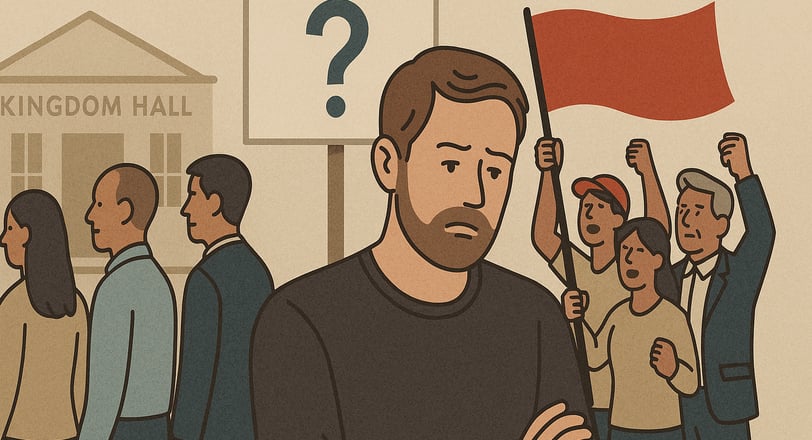From Cult to Culture War: Why Some ExJWs Embrace Right-Wing Populism — And Why I Haven’t
Why are some ex-Jehovah's Witnesses drawn to right-wing populism after escaping a high-control religion? In this post, I reflect on the appeal of certainty, distrust of institutions, and the lingering influence of old beliefs — while explaining why I personally lean left, cautiously and consciously.
Oliver
4/24/20255 min read


I’ve been thinking a lot about how we rebuild belief — not religious belief necessarily, but all the other ones. Political convictions. Moral frameworks. Social identity. After leaving a high-control religion, you’d expect people to be wary of any group claiming to hold “the truth.” And yet, I keep seeing it: former Jehovah’s Witnesses — people who woke up, walked away, and lost everything — now passionately reposting culture war talking points, praising populist leaders, and diving headfirst into right-wing echo chambers.
At first, I found it strange. Now, I find it… almost understandable. Even familiar.
And I say that with a lot of caution, because I’m still figuring out where I stand myself. Not because I’m afraid to commit — but because I don’t want to trade one form of dogma for another. I’m slow to claim labels. I’m cautious about expressing where I fall on the ideological spectrum — not just because I’ve left the beliefs behind, but because I’m still catching myself acting out old patterns I didn’t even realize were there — and learning to unlearn takes time. I want to stay open to respectful conversation. I don’t want to slam the door on people who might think differently — especially if they’re on a similar journey out of fundamentalism.
That said, I’ve been feeling more and more unsettled. The current political climate in the U.S., and some echoes of it here in Canada, make it hard to stay silent. I don’t believe the political left has all the answers. I’ve seen the flaws — the performative moralizing, the occasional groupthink, the virtue signaling. But here’s the thing: I’ve yet to see danger coming from that side in the same way. I don’t see hate being normalized or cruelty being rationalized. And I definitely don’t see the kind of authoritarian energy that reminds me of what I left behind.
So why does the populist right speak so strongly to some exJWs?
Here are a few things I’ve noticed — both from what I’ve seen and what I’ve felt creeping up in myself.
The Appeal of Certainty
Leaving the Witnesses often means stepping into a world without guardrails. You’ve gone from “we have the truth” to “nobody really knows anything,” and that can be terrifying. Right-wing populism — with its clear enemies, strong leaders, and moral clarity — scratches that old itch for certainty. It offers something familiar: we are the good ones; they are the problem.
In a world of ambiguity, that kind of clarity feels like safety.
The Reflex to Distrust
When you’ve been lied to by the organization you trusted with your life, it messes with your head. You start to assume everyone is lying. Government? Corrupt. Media? Bought and paid for. Scientists? Manipulated. Suddenly, fringe voices sound like freedom fighters. You start to think, “If they were wrong about that, maybe they’re wrong about everything.”
It’s a completely understandable reaction — but it can lead you right into the arms of a new manipulator.
A New “Chosen” Identity
There’s a certain thrill to believing you see something others don’t. That you’ve awakened from the matrix. That you’re not like the “sheep.” This is something the Watchtower drilled into us for years — and it turns out, it translates really well into culture war politics.
A lot of populist rhetoric plays with that exact same narrative: the elite are lying; the media is brainwashing you; only a few of us see what’s really going on. For exJWs who grew up believing they were part of a chosen few, this can feel like home — just with a different flag.
Reactionary Energy Feels Like Control
There’s also the trauma angle. Leaving a cult is disorienting. Powerless. You feel like your world was built on sand. And sometimes, grabbing onto a strong political identity feels like taking control back. Like shouting, “No one’s going to manipulate me again.”
But sometimes what feels like healing is just repackaged control. It just looks tougher this time. More cynical. More defiant.
Where I Personally Stand — and Why I'm Still Cautious
I’ve said before that I approach politics like someone cautiously re-entering a world I was taught to fear. I grew up with the idea that political neutrality was godly, and all human governments were doomed. That doesn’t go away overnight.
Sometimes I wonder if part of my reluctance to take public stances is still tied to that deeply anchored idea of not wanting to “stumble” anyone. That old fear of being a bad influence — of saying the wrong thing and causing harm — is hard to shake. Add to that my people-pleasing tendencies, and you’ve got a cocktail of internal filters I’m still trying to untangle.
And yet, I’m not afraid of being Mr. Nice Guy. I value kindness. I still believe in showing respect, listening first, and not letting ideology get in the way of humanity. But I also know that sometimes silence helps the wrong side. And I’m learning that clarity, even when it risks discomfort, can be a form of care too.
I lean left. Not blindly. Not because I think progressive movements are flawless. But because I believe in protecting the vulnerable. Because I value science, education, bodily autonomy, and equality. Because I don’t see the left trying to erase my friends or ban books or scapegoat immigrants. Because I don’t think cruelty should be policy.
I also believe in nuance. In listening. In letting people evolve. I don’t want to recreate the “us vs. them” mentality that shaped my childhood — even if now I think I’m on the right side of the issues.
No Quick Conclusions
This isn’t a call-out post. It’s not even really a “political” one. It’s just me thinking out loud — wondering how we can come out of one control system only to walk straight into another, and not even realize it. It’s me saying, if you’re in that place right now — feeling like the world is falling apart and only a few people really get it — I see you. I’ve been there.
But I also think it’s worth asking: what does real freedom look like? What does rebuilding belief responsibly actually require? And are we choosing our new ideologies — or are they choosing us?
I don’t have all the answers. But I know I don’t want to be told how to think ever again. And I definitely don’t want to become so certain that I stop listening.
And here’s the twist: some of the ideas I’m working through lately might actually surprise people. A few of them lean more conservative — or at least brush up against ideas we’re told only exist on that side of the spectrum. So if you’re curious (or skeptical), keep an eye out — I’ve got a follow-up post or two in the works.
Side note: If you’re wondering where all this is coming from — my thoughts, hesitations, and baggage — I explore more of that personal journey over on my other blog, Totally Awake!, which focuses more on my experience leaving a high-control religion and everything that came with it.
Also, I’m looking forward to reading On Freedom by Timothy D. Snyder with the Liberati Book Club this May. The Liberati is a community for those in the process of leaving — or who have already left — a high-control group. They also host a private Facebook group for deeper connection and discussion. Learn more at theliberati.org.
